Ever turned the key and heard… nothing? That sinking feeling usually means one thing: your battery’s done. I’ve had it happen on cold mornings and in grocery store parking lots—and let me tell you, it’s never fun. If you’re wondering how much is a new car battery costs, you’re not alone. I’ve bought my fair share over the years, and prices can vary more than you’d expect. In this guide, I’ll break down real costs, share what I’ve learned, and help you figure out how much a car battery costs, how much it is installed, and how long the average one lasts, without the guesswork. Let’s get into it.
A Simple Guide to Car Battery Costs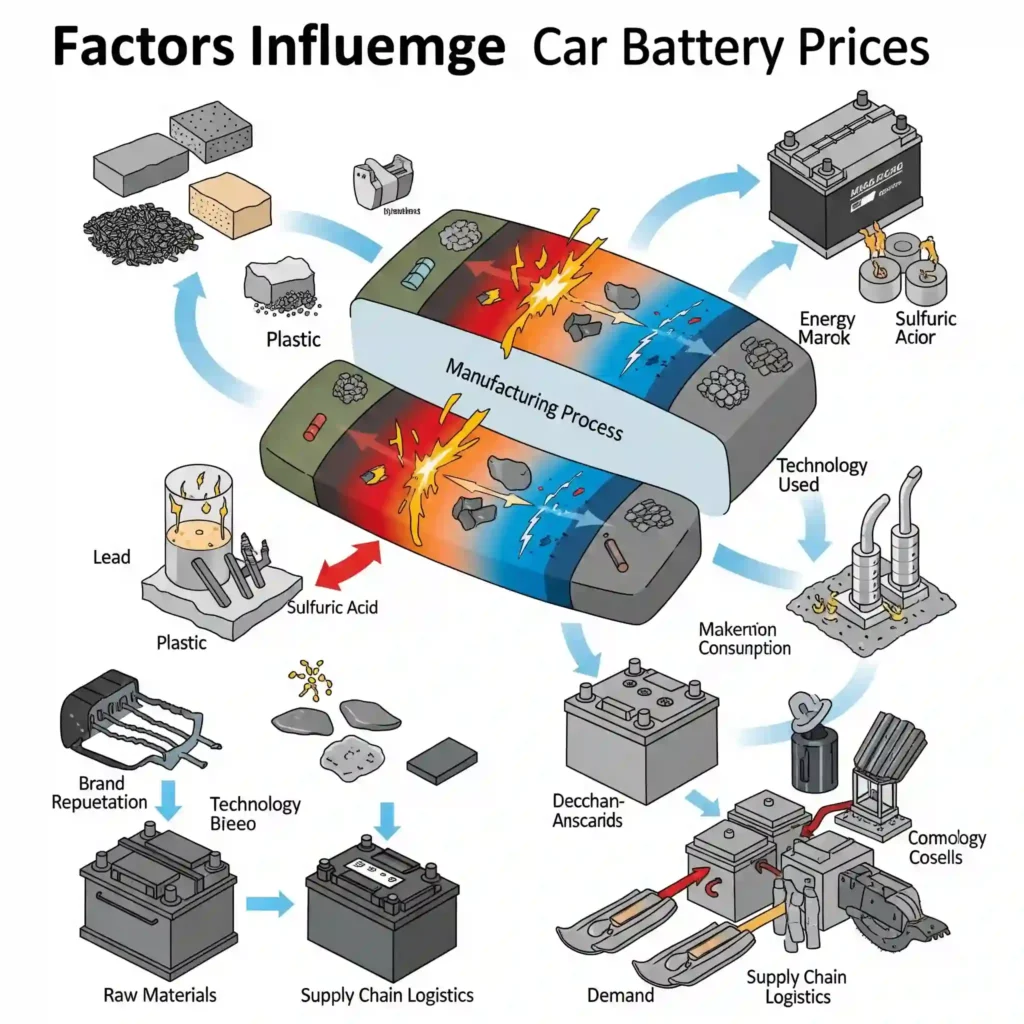
So, why do car battery prices feel all over the place? It’s not just random. Several things come into play, and knowing what they are can help you avoid overpaying—or worse, buying the wrong one.
First Up: Your Vehicle Make and Model
Some cars need more power, especially trucks, SUVs, or newer models loaded with tech. When I replaced the battery in my compact sedan, I paid under $120. But the one for my SUV? That was closer to $200. Short answer: Bigger cars often need bigger (and more expensive) batteries.
Next Is Battery Type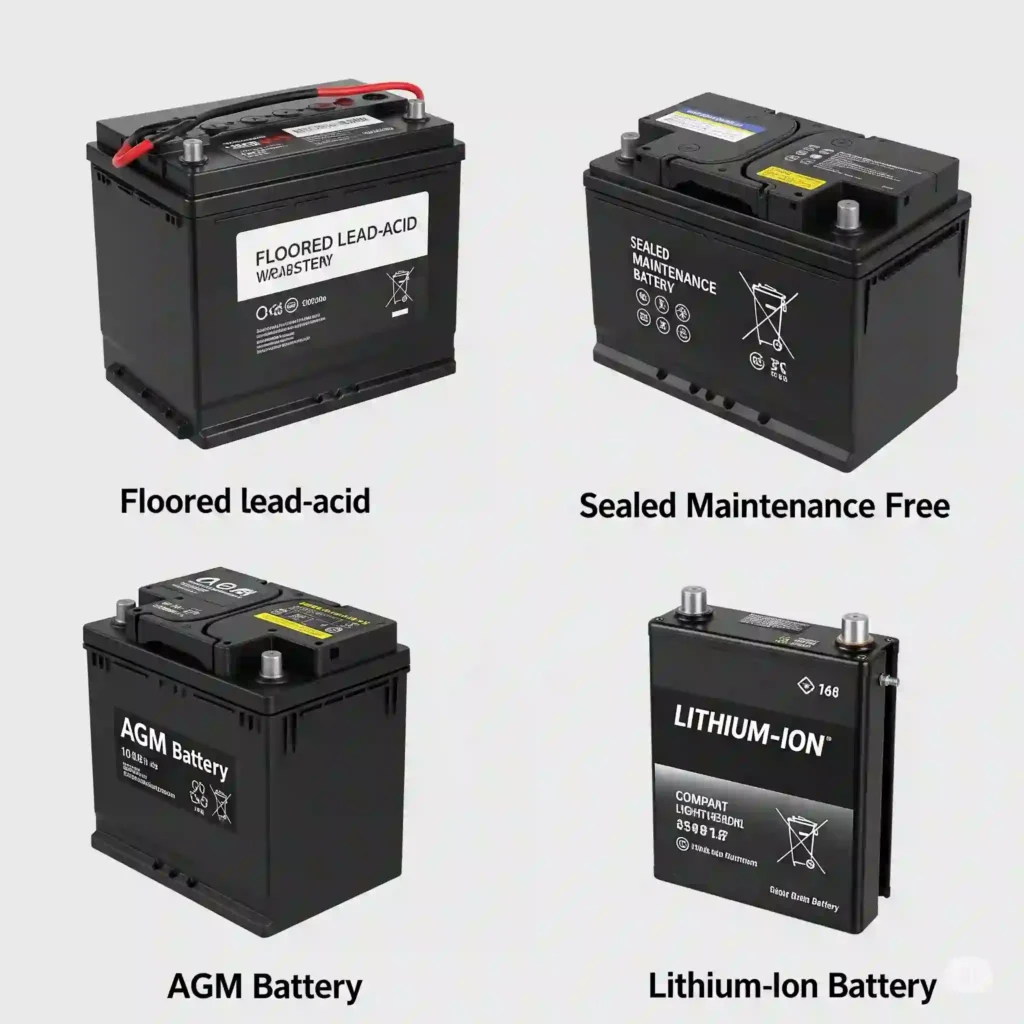
Most cars use lead-acid batteries, which are cheaper and reliable. But newer vehicles or those with stop-start features may need AGM (Absorbent Glass Mat) or even lithium-ion batteries. These can run double the price—but they last longer and handle high-drain systems better.
Brand and Warranty Matter Too 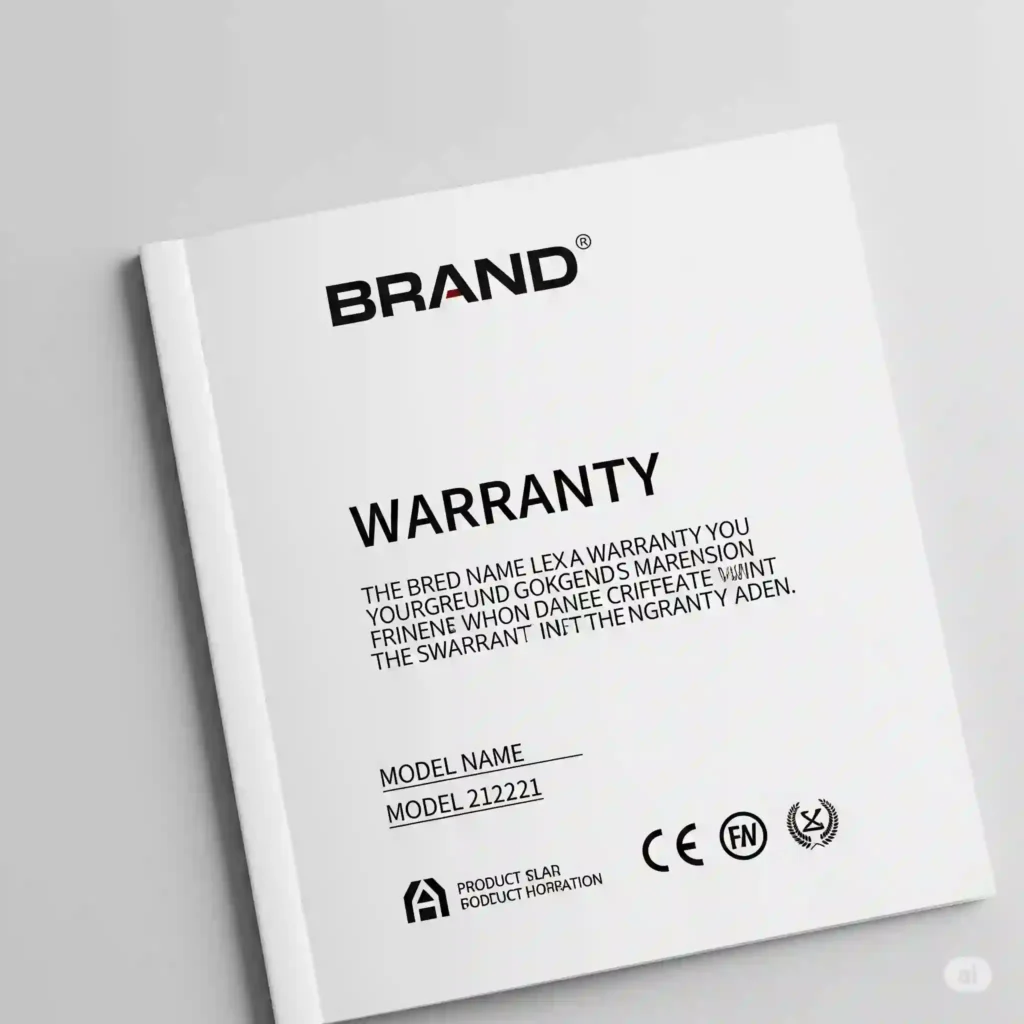
You might see a $90 battery next to a $150 one with a longer warranty and trusted brand name. That peace of mind? Sometimes it’s worth the extra bucks. I once went cheap, and the battery barely lasted two winters. Never again.
Cold Cranking Amps (CCA) and Reserve Capacity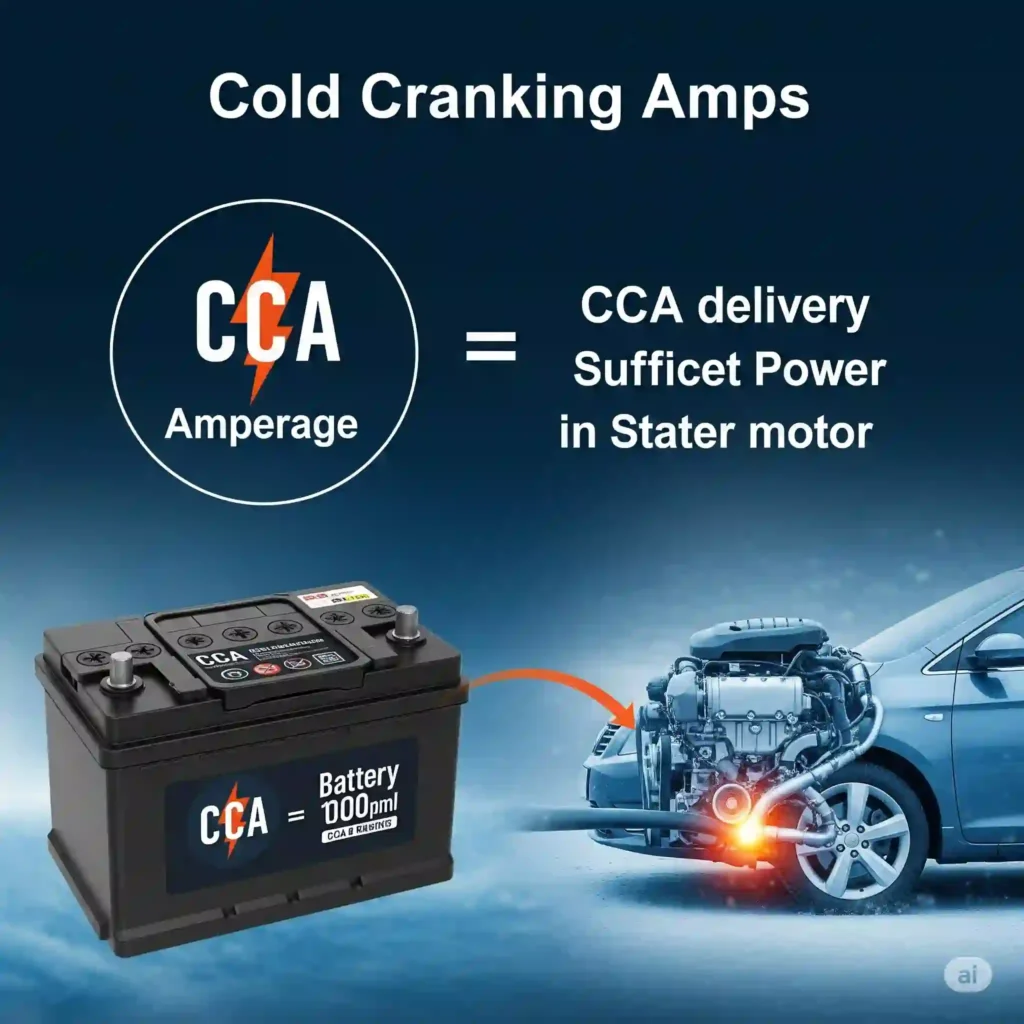
Think of CCA as how strong the battery is on a freezing morning. The higher the number, the better it starts in cold weather. Reserve capacity tells you how long your battery can keep things running if the alternator fails.
From my experience, two nearly identical-looking batteries can differ by $50 or more. It often comes down to what’s inside—and whether it matches your car’s needs. Learning that the hard way cost me time, money, and one very awkward call to roadside assistance.
How Much Does a New Car Battery Cost in the USA?
Car battery prices in the U.S. can feel like a mystery until you’re standing in the store, wallet in hand. But once you know what to look for, it’s easier to spot a fair deal.
So, how much is a new car battery?
In general, expect to pay between $70 and $350 depending on the battery type and where you buy it.
Let me break it down based on my own shopping experience:
- Economy batteries run about $70 to $130. I once grabbed one of these for an older car I barely drove. It got the job done, but don’t expect high performance in extreme temps.
- Mid-range batteries are around $130 to $200. This is the sweet spot for most drivers. When I replaced my sedan’s battery, I went mid-range. It had a decent warranty and has held up well through two winters.
- Premium or AGM batteries can cost $200 to $350. I chose one of these for my SUV. It cost more up front, but it’s been rock-solid through cold starts and long trips with the A/C blasting.
Where you buy also affects the final price—sometimes by a lot. I’ve compared prices across stores, and here’s what I’ve seen:
-
- Auto parts stores like AutoZone and Advance Auto often have solid warranties and frequent promos. I once found a mid-tier battery at AutoZone for $165, and they installed it free.
- Dealerships usually charge more. I was quoted $300 for the same battery that cost me $210 elsewhere. Unless your car needs a dealer-specific part, you can often save big by going somewhere else.
- Walmart and Costco? Great for savings. Costco especially—it’s where I got my last battery for $110, and it came with a 42-month warranty. That was a win.
- Online options like Amazon can be cheaper, but make sure you’re getting the right fit for your vehicle—and factor in shipping if installation isn’t included.
-
Here’s What I’ve Learned:
where and what you buy matters just as much as the price. The first time I shopped without comparing, I overpaid. Now, I check three places before making a move. A quick 10-minute search can save you $50 or more.
In short, a new car battery in the U.S. usually costs between $70 and $350, with the best deals often found at wholesale clubs or trusted auto stores with free installation.
How Much Is a New Car Battery Installed?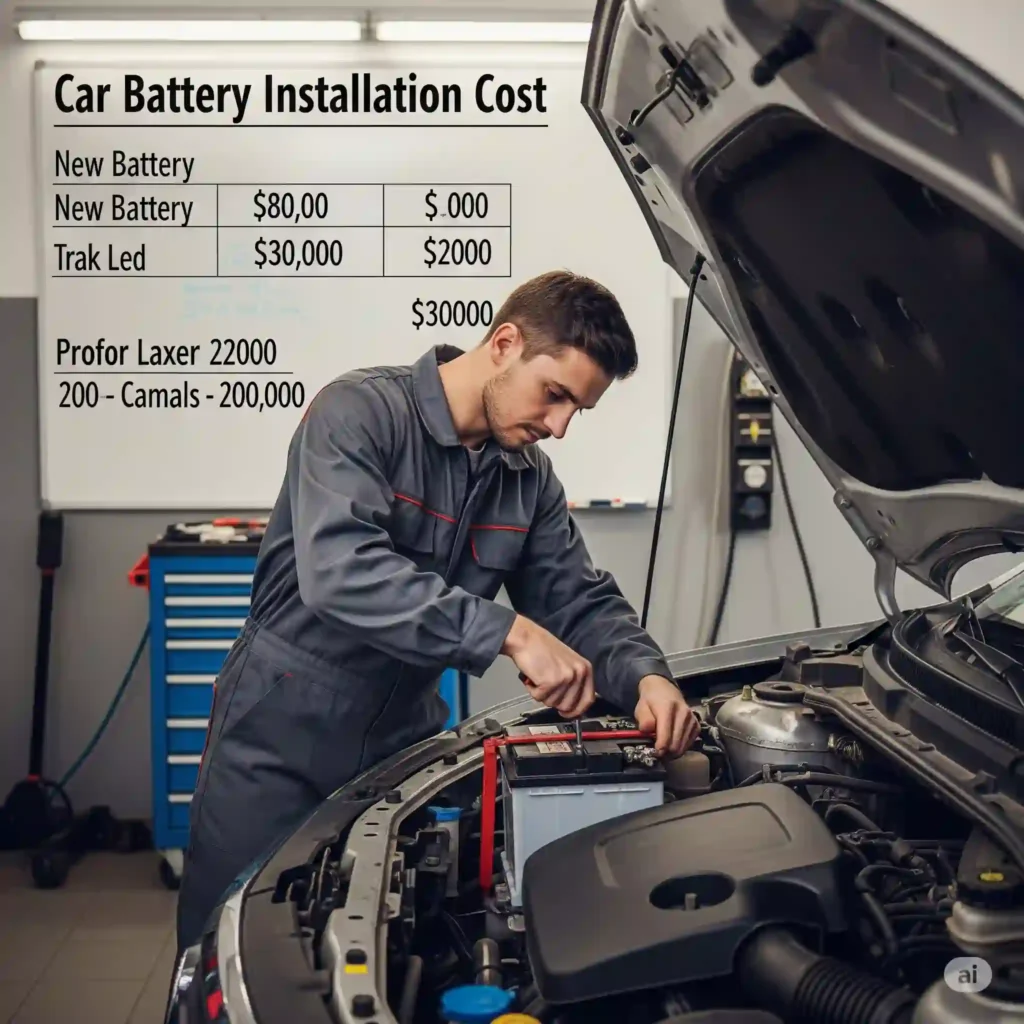
Buying a car battery is one thing—but getting it installed? That’s where the hidden costs can sneak in. I’ve learned this the hard way more than once.
In most cases, battery installation costs between $20 and $75. But here’s the good news: a lot of places will actually do it for free if you buy the battery from them. That’s one of those small wins that can make your day.
I’ve done both DIY and paid installs. When my sedan’s battery died on a quiet Sunday, I grabbed a wrench, pulled up a quick video, and swapped it myself in under 20 minutes. No cost, just a little elbow grease and a sense of pride. But when my SUV’s battery went out? Total nightmare. It was buried under a panel, half-hidden by wires. I ended up at a local auto shop and paid $30 to have it installed—and honestly, it was worth every penny to avoid the headache.
Many auto parts stores, like AutoZone or Advance Auto, install batteries for free when you buy from them. That’s where I got the best deal last winter. I walked in, picked out a mid-range battery, and the guy had it in my car before I could finish my coffee.
Dealerships, though? They tend to charge the most. One quoted me $70 just for installation, and that didn’t even include the battery. That same battery at Costco was $100 cheaper—and I got a longer warranty. No brainer.
If you’re not sure whether you’re getting a deal, just ask. Sometimes all it takes is a simple, “Hey, is installation included?” to save yourself some money.
So while installing a new car battery can cost nothing or up to $75, where you go makes all the difference. My rule? If a place charges for install and won’t budge, I walk—or check another store online. There’s always a better option if you know where to look.
How Much Should I Pay for a New Car Battery?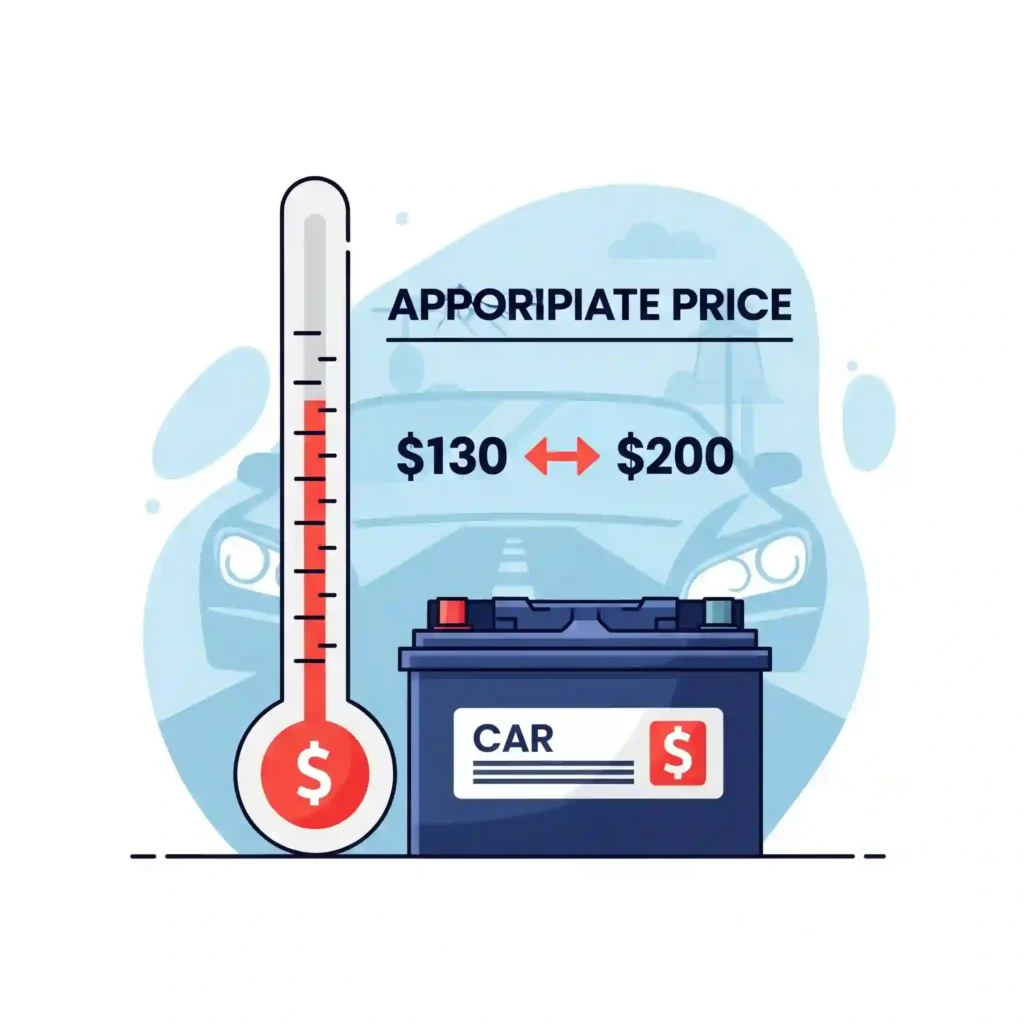
You should expect to pay between $130 and $200 for a quality car battery that fits most vehicles. Go below that, and you might be sacrificing performance. Pay much more, and you might be overcharged—unless your vehicle really needs a high-end model.
Here’s The Thing:
I’ve bought car batteries for $90 and others for over $250. The cheaper one? It lasted just over a year. It struggled in the winter and gave out on a freezing January morning—right when I had an early meeting. That wasn’t fun. I had to get a jump, miss half the day, and spend more than I saved. Lesson learned.
-
What’s a Fair Price?
If your car uses a standard lead-acid battery, aim for $130 to $170. That’s the sweet spot. It gets you a decent warranty, solid cold-weather performance, and enough juice for most vehicles. If your car needs an AGM battery (common in luxury or start-stop vehicles), then yes—it can go up to $250 or more, and that’s normal.
Watch out for “too good to be true” deals. I once saw a battery online for $65 and thought I scored. But the fine print? No warranty, poor customer reviews, and shipping wasn’t free. I skipped it—and good thing I did. A friend of mine bought that same battery and it failed in five months. And the return process? A total pain.
-
Want to Be Sure You’re Not Overpaying?
Always check your owner’s manual or the battery label under your hood. Look for things like group size, cold cranking amps (CCA), and reserve capacity. These specs matter more than the price tag alone. One time, I bought a “deal” battery without checking the group size, and it didn’t even fit the tray. Had to return it, waste of time.
-
Here’s a tip I live by now:
Use online tools (like AutoZone or Advance Auto’s fit guide) to compare prices before you buy. It takes five minutes and can save you $50–$100. I do it every time. You’d be surprised how different prices can be for the exact same battery.
-
What Should You Pay?
Stick to $130–$200 for most cars, or $200–$350 for premium or AGM batteries. Avoid prices that seem too cheap unless you’re okay risking a short lifespan or weak warranty. And skip dealerships unless it’s your only option—they almost always charge more.
At the end of the day, it’s not just about the price—it’s about peace of mind. The right battery starts every time, lasts through the seasons, and saves you from being stranded. To me, that’s worth a few extra bucks.
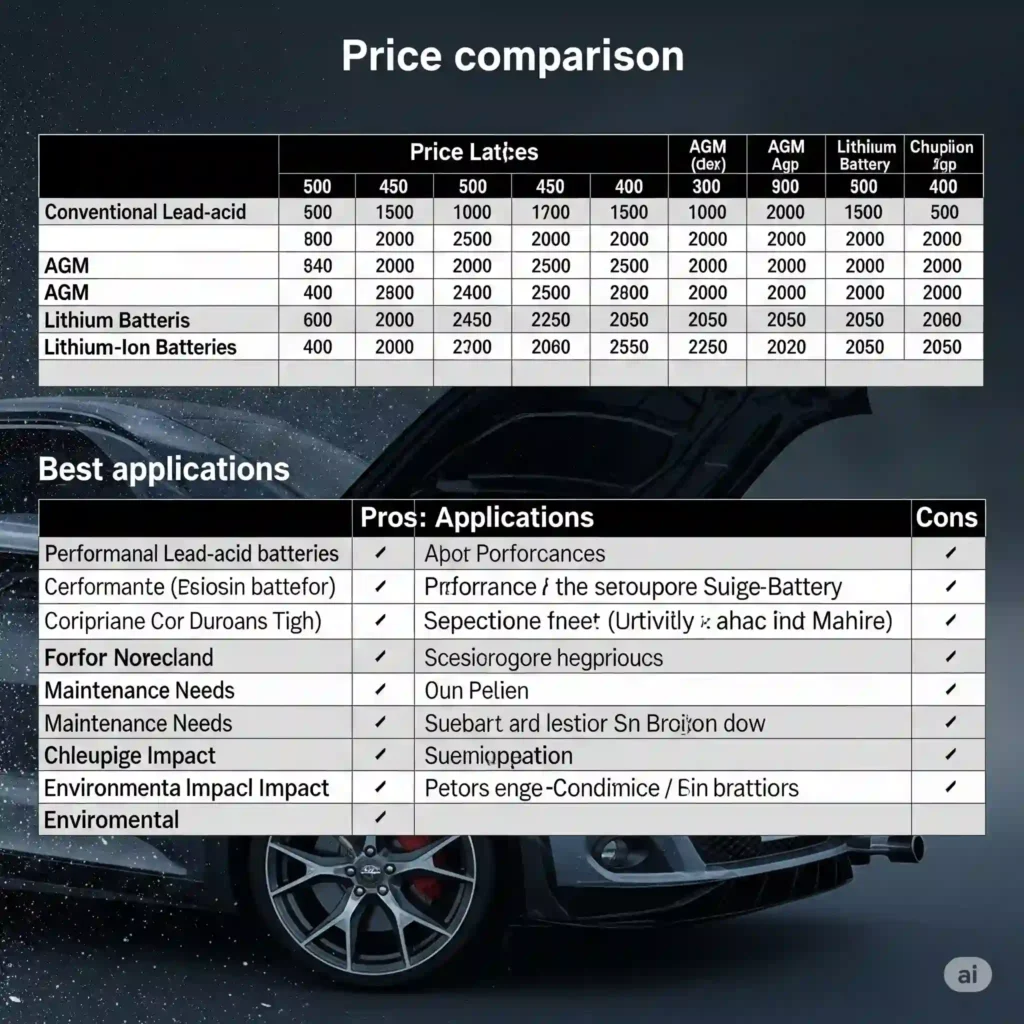 Car Battery Price Comparison Table:
Car Battery Price Comparison Table:
| Battery Type | Price Range (USD) | Best For | Pros | Cons |
| Economy | $70 – $130 | Older/secondary vehicles | Budget-friendly, gets the job done | Shorter lifespan, weak in extreme weather |
| Mid-Range | $130 – $200 | Most daily drivers | Good balance of performance and value | Limited advanced features |
| Premium / AGM | $200 – $350+ | SUVs, luxury, start-stop systems | Longer life, great in cold, better reliability | Higher upfront cost |
| Lithium-Ion | $300 – $800+ (rare) | EVs and specialty vehicles | Lightweight, high-tech, long-lasting | Expensive, not widely used in gas vehicles |
Tip: For most vehicles, mid-range or AGM batteries are the smartest choice—balancing cost, power, and reliability.
How Long Does the Average Car Battery Last?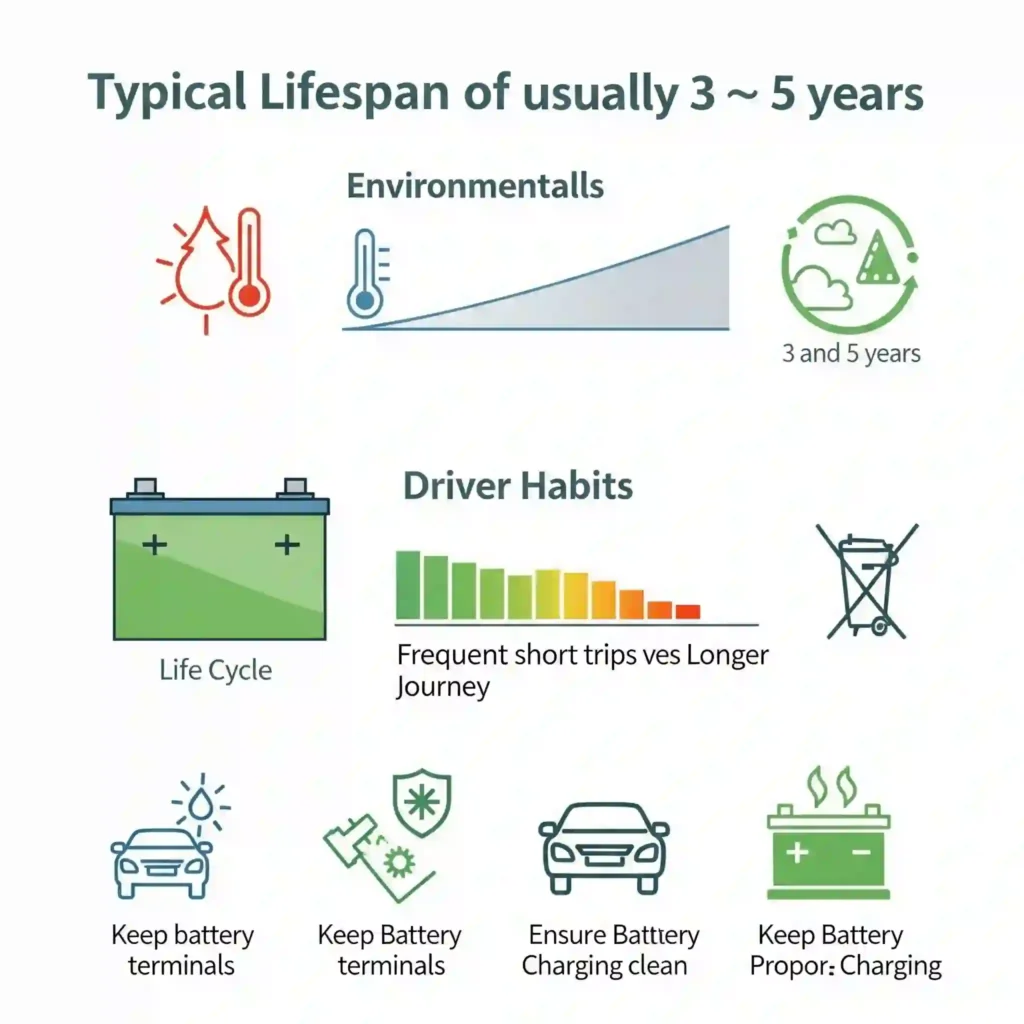
Most car batteries last about 3 to 5 years. But here’s the thing—how long yours actually lasts depends on more than just the calendar.
When my first battery gave out just shy of its third birthday, I thought I got a dud. But looking back, I was doing everything wrong. I barely drove during the week, and when I did, it was short 10-minute trips. No time for the alternator to recharge the battery fully. Lesson learned: Short trips and infrequent driving can kill a battery faster.
Cold or hot weather? Both are battery killers. I lived in Chicago for a while, and winters were brutal. My car would groan in the mornings like it didn’t want to wake up either. Batteries work harder in extreme temps—cold thickens oil and slows cranking; heat cooks the fluid inside. Extreme weather can shorten battery life to just 2–3 years.
Another factor? Maintenance—or the lack of it. Corroded terminals, loose cables, or leaving lights on overnight can drain or damage a perfectly good battery. I once found my car completely dead because a backseat light stayed on all weekend. Now I check twice. Keeping terminals clean and secure helps your battery last longer.
A good sign your battery’s aging? Slow starts, dim lights, or a check battery warning. When my battery was on its last leg, I noticed the radio resetting every time I started the car. It was subtle, but a clear warning sign. If you’re seeing that kind of stuff, get it tested—most auto stores do it free.
If you want to make your battery last longer, here’s a quick tip that’s worked for me: Take longer drives now and then to give your alternator enough time to fully recharge the battery. Quick errands don’t cut it. And if your car sits for days at a time? Hooking up a trickle charger can be a game-changer. It keeps the battery topped off and healthy.
So yeah, 3–5 years is the average—but how you drive, where you live, and how you treat your battery can push it closer to 2… or help it last beyond 5.
Tips for Choosing The Right Car Battery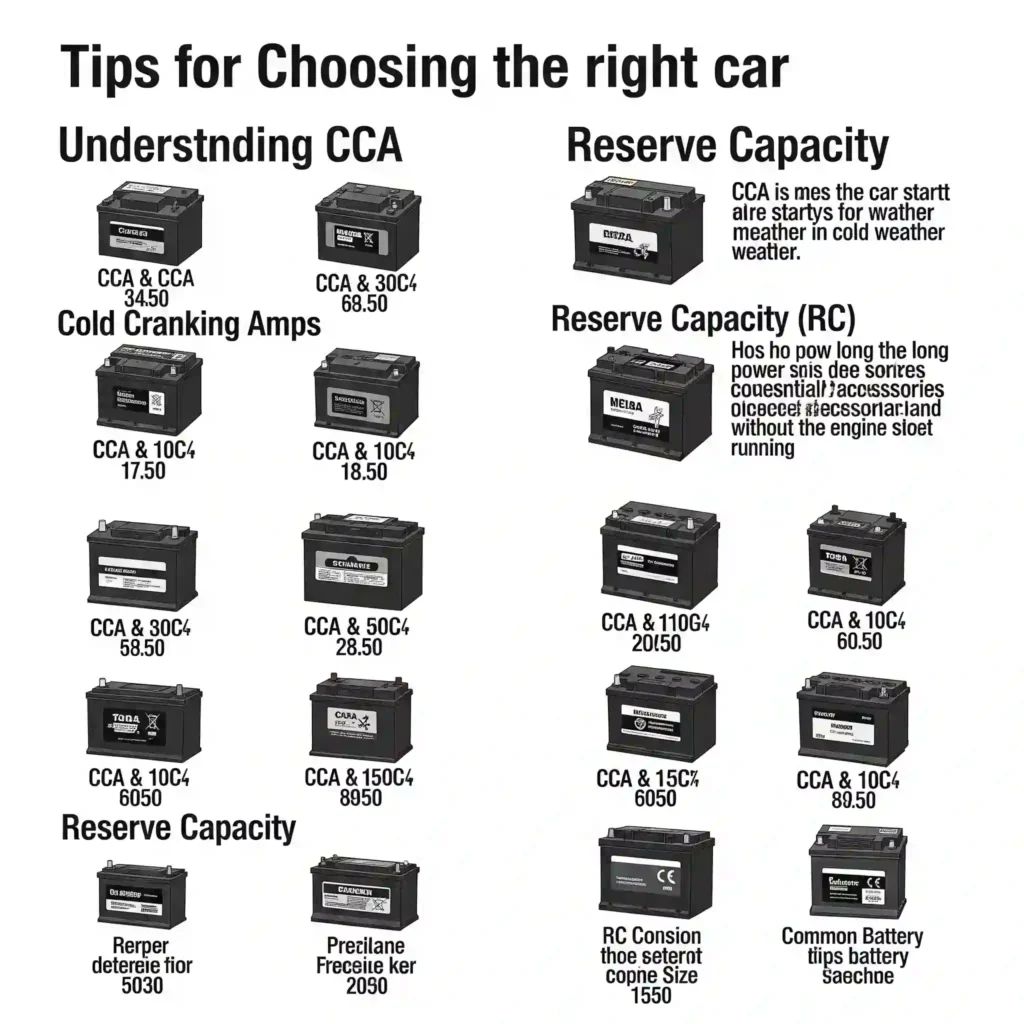
Choosing the right car battery isn’t rocket science—but it can feel like it if you’re standing in an auto parts store, staring at rows of batteries that all look the same. I’ve been there, more than once, trying to figure out why one costs $140 and the one next to it is $220. Truth is, they’re not all the same—and picking the right one can save you from future headaches.
Start With What Your Vehicle Actually Needs
Every car has specific requirements, and the best battery for your friend’s truck might be all wrong for your compact sedan. I always check the group size, cold cranking amps (CCA), and reserve capacity before I buy. Once, I ignored those specs and grabbed a “great deal” that didn’t fit the tray. Had to drive back and swap it out—lesson learned the hard way. A few minutes checking your owner’s manual (or a site like AutoZone or Advance Auto’s fit tool) can save you a lot of hassle.
Match The Battery Type to How You Drive
If you mostly drive short trips or live in a city with stop-start traffic, an AGM battery might be worth the extra cost. They handle frequent starts better and hold up longer under stress. I drive a mix of highway and city miles, and when I upgraded to an AGM for my SUV, I noticed stronger starts—even on cold mornings. It was $50 more than a lead-acid battery, but it’s been rock solid for over four years now.
Don’t Overlook CCA and Reserve Capacity
Think of CCA as your battery’s “muscle” on cold mornings. If you live somewhere that winter likes to show off, aim for a higher CCA rating—it makes starting the engine easier when everything’s frozen. Reserve capacity, on the other hand, is like your emergency fuel. It’s how long your battery can run essentials if the alternator fails. I once lost a belt on a road trip, and my battery’s reserve capacity bought me just enough time to pull into a shop before everything died. Not all heroes wear capes.
Go for Quality—and a Good Warranty
It’s tempting to grab the cheapest option and call it a day. I’ve done it. But cheaper batteries often come with shorter lifespans and weak warranties. I had one die just after the 12-month mark. Meanwhile, my Costco battery, which cost a little more, came with a 42-month warranty and hasn’t flinched through three Midwest winters. If a brand stands behind their battery for three or four years, it’s probably built to last.
Weigh Cost Against Convenience
Sometimes, paying a little more means better service. I’ve gotten free installation at AutoZone and Advance Auto just for buying there. One time, I was in and out with a new battery in 15 minutes—no tools, no stress. On the flip side, I once ordered a cheaper battery online, but had to install it myself in a freezing garage. Worth it? Not really.
Think About The Long-term
A good battery isn’t just about today’s price—it’s about not getting stranded on a rainy night or paying a tow fee because your car won’t start in the grocery store lot. I’d rather pay an extra $30 now than deal with that mess later.
So, to keep it simple: check your car’s specs, pick the right battery type, aim for strong CCA and reserve capacity, go for a reputable brand with a solid warranty, and think about where you’re buying from. You don’t have to be a mechanic to make a smart choice—you just need to be a little prepared.
That’s how I saved money, avoided stress, and found a battery that actually fits my life—not just my car.
Where to Buy a New Car Battery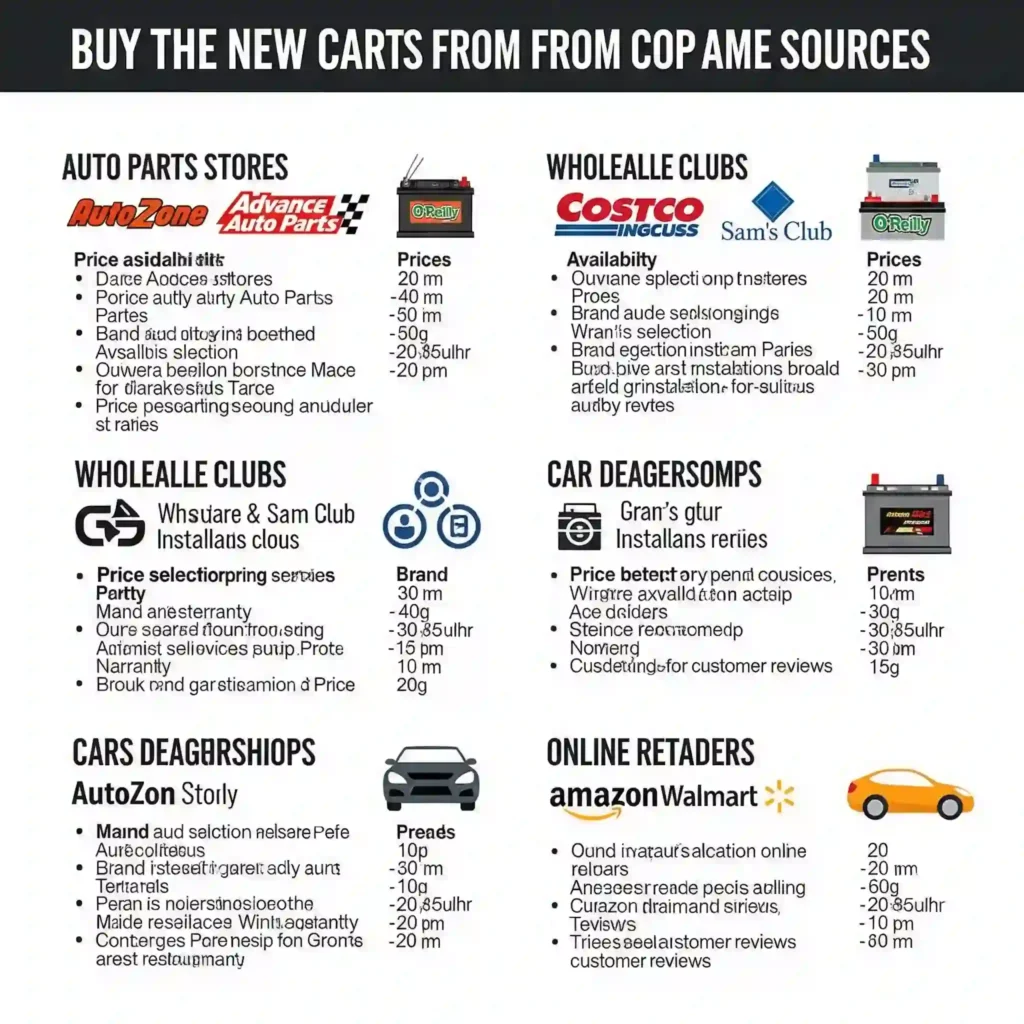
Buying a new car battery isn’t exactly exciting—but where you buy it really matters. I’ve shopped at big box stores, online sites, auto parts shops, and even the dealership (once—and I regretted it). Each place has its pros and cons. The key is knowing which one fits your needs—and budget—best.
Let’s Start With The Auto Parts Stores
Places like AutoZone, Advance Auto Parts, and O’Reilly are everywhere. They’re reliable, fast, and most of the time, the staff know what they’re doing. I’ve walked into AutoZone with a dead battery, picked a replacement, and had it installed for free—all in under 20 minutes. They also offer battery testing, recycling, and solid warranties. You pay a little more than bargain places, but you get peace of mind. That’s worth something.
Next Up: Costco and Sam’s Club
Wholesale clubs are my go-to when I want to save cash and get a good warranty. Costco, in particular, surprised me. I bought a battery for my wife’s car there for about $110—and it came with a 42-month warranty. The only downside? They don’t install, so you’ll need to either DIY or find someone who will. Still, if you’re comfortable turning a wrench (or have a buddy who is), it’s a steal.
Then There’s The Dealership
I’ll be honest—this is usually my last resort. I once asked a dealership about a battery for my SUV, and they quoted me $300. For the same exact brand and model I found at AutoZone for $210. The only time I’d go this route is if your vehicle has a battery that’s super hard to get or install. Otherwise, skip it.
Online retailers like Amazon and Walmart
Shopping online can be hit or miss. I’ve found great deals on Amazon—like brand-name batteries for way less than in stores. But here’s the catch: you’ve got to double-check fitment. I once ordered a battery that technically fit my car but had the terminals on the wrong side. Rookie mistake. Walmart can be great too—they often have rollback pricing and will install it for free if you buy in-store. Just be sure to check the warranty terms; they vary more than you’d think.
My Personal Pick
If I’m in a hurry and want it done fast, I hit AutoZone or Advance Auto. If I’ve got time and want to save, Costco wins—hands down. And if I need a battery delivered (like when my car’s stuck in the garage), I’ll check Amazon—but only after triple-checking the specs.
At the end of the day, buying a battery is a bit like ordering takeout. You can go fast, cheap, or fancy—but rarely all three. Find the balance that works for you, and remember: a little research now saves a lot of stress later.
Frequently Asked Questions
How much does a new car battery cost?
Most car batteries cost $70 to $350, depending on the type, brand, and where you buy it.
What is the average cost for a car battery with installation?
With install, expect to pay $90 to $400. Some stores, like AutoZone or Advance Auto, will install it for free if you buy from them.
How long does a car battery last?
Most car batteries last 3 to 5 years. Heat, cold, and short trips can make them die faster.
What’s the best car battery for cold weather?
Look for one with high Cold Cranking Amps (CCA). These batteries start better in freezing temps.
Can I install a car battery myself?
Yes! If it’s easy to reach, many people install it at home in 15–30 minutes with basic tools.
What are AGM batteries?
AGM stands for Absorbent Glass Mat. They last longer, charge faster, and work well in cars with lots of tech.
Is it cheaper to buy a battery online?
It can be, but make sure it fits your car. You may have to install it yourself or pay extra for help.
Do cheap car batteries work?
Yes, but they often don’t last as long. They may struggle in cold or hot weather.
Where’s the best place to buy a car battery?
For price: Costco or Walmart.
For speed and free install: AutoZone or Advance Auto Parts.
Avoid: Dealerships (they cost more).
How do I know which battery fits my car?
Check your owner’s manual or use online tools from AutoZone or Advance Auto. Look for the group size, CCA, and terminal layout.
What voids a car battery warranty?
Things like poor install, the wrong battery type, or damage from leaks can void it. Always keep your receipt and follow care tips.
How can I make my car battery last longer?
- Drive longer trips now and then
- Keep the terminals clean
- Don’t leave lights on
- Use a trickle charger if your car sits for days
 Final Thoughts: What I’ve Learned from Replacing Car Batteries
Final Thoughts: What I’ve Learned from Replacing Car Batteries
Replacing a car battery doesn’t have to be confusing or costly. Over the years, I’ve learned that how much is a new car battery depends on your vehicle type, where you buy it, and if installation is included. Prices range from $70 to $350, and you can often find free installation at popular retailers.
Before you buy, check your car’s battery specs, compare prices at auto stores and wholesale clubs, and look for coupons or rebates. Most batteries last 3–5 years, so it’s smart to keep an eye on the date code and signs of failure.
My advice? Don’t wait for your battery to die. Be proactive, ask questions, and choose a battery that fits both your car and your budget. Knowing how much you should pay for a car battery can save you money and stress down the road.

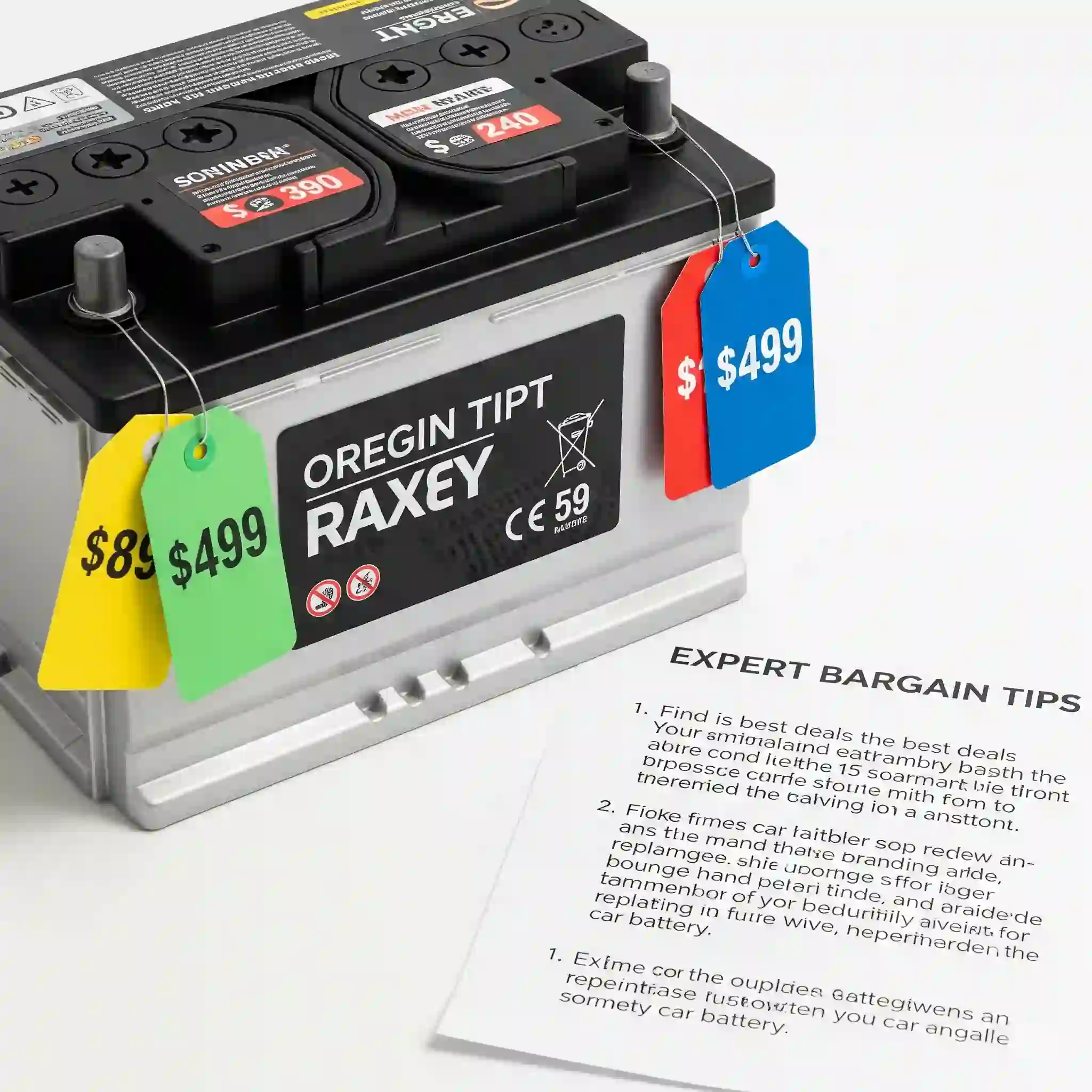
1 thought on “How Much Is a New Car Battery? Expert Bargain Tips!”